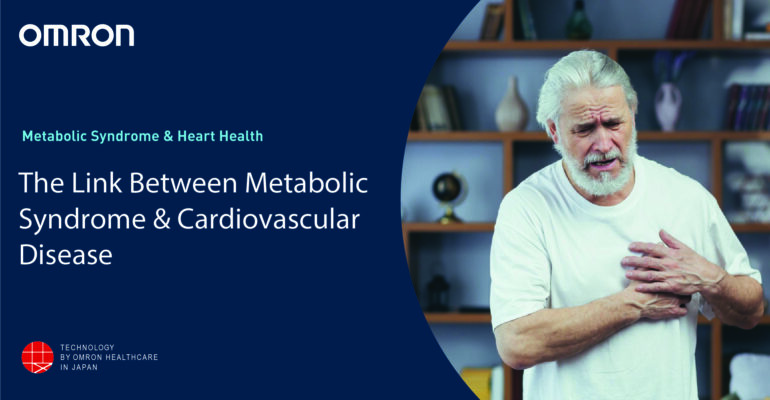The Link Between Metabolic Syndrome and Cardiovascular Disease
June 7, 2023 2023-11-28 18:22The Link Between Metabolic Syndrome and Cardiovascular Disease

The Link Between Metabolic Syndrome and Cardiovascular Disease
Metabolic syndrome and cardiovascular disease are two significant health conditions that have become increasingly prevalent in recent years. Understanding the strong association between metabolic syndrome and cardiovascular disease is crucial for healthcare professionals and individuals seeking to prevent or manage these conditions. In this blog, we will explore the hidden connection between metabolic syndrome and cardiovascular disease, supported by relevant facts and evidence.
What is Metabolic Syndrome?
Metabolic syndrome is a cluster of health conditions characterized by a combination of factors, including obesity, high blood pressure, abnormal cholesterol levels, and insulin resistance. It serves as a precursor to more severe health problems, such as type 2 diabetes and cardiovascular disease. The world-wide prevalence is on the increase, with the overall global prevalence estimated to be 20-25% of the adult population.[1]
Components of Metabolic Syndrome:
- Obesity and Abdominal Adiposity: Obesity, particularly excess fat around the waistline, is a major contributor to metabolic syndrome. Adipose tissue releases inflammatory substances that can lead to insulin resistance and cardiovascular complications.
- High Blood Pressure (Hypertension): Hypertension is a common component of metabolic syndrome. Increased blood pressure puts additional strain on the heart and blood vessels, increasing the risk of cardiovascular disease.
- Dyslipidemia: Metabolic syndrome often involves abnormal cholesterol levels, such as high triglycerides and low levels of high-density lipoprotein (HDL) cholesterol. These lipid abnormalities contribute to the development of atherosclerosis, a major cause of cardiovascular disease.
- Insulin Resistance: Insulin resistance occurs when cells fail to respond to insulin correctly, resulting in high blood sugar levels. Insulin resistance promotes inflammation and negatively affects cardiovascular health.[2]
Shared Risk Factors and Pathophysiology:
Metabolic syndrome and CVD share common risk factors, including sedentary lifestyle, poor diet, and genetic predisposition. Obesity, particularly abdominal obesity, is a significant risk factor for both conditions. The underlying pathophysiology involves complex mechanisms such as chronic inflammation, insulin resistance, endothelial dysfunction, and dyslipidemia.[3]
Impact on Global Health:
Metabolic syndrome and CVD exert a significant burden on global health. They contribute to escalating healthcare costs, reduced quality of life, and premature mortality. The socioeconomic impact of these conditions is substantial, with productivity losses and increased healthcare expenditures.[4]
Certain populations, including individuals from lower socioeconomic backgrounds and minority groups, face a higher prevalence and greater burden of metabolic syndrome and CVD. Addressing health disparities and promoting equitable access to healthcare services are crucial for reducing the impact of these conditions.
The Link Between Metabolic Syndrome and Cardiovascular Disease:
Metabolic syndrome significantly increases the risk of developing cardiovascular disease. Here are some key facts supporting this connection:
- Increased Risk of Heart Attacks and Strokes: Individuals with metabolic syndrome are two to four times more likely to experience heart attacks and strokes compared to those without the syndrome.
- Impact on Cardiovascular Mortality: Metabolic syndrome is associated with a higher risk of cardiovascular mortality, emphasizing the importance of early detection and management.
- Underlying Mechanisms: Chronic inflammation, oxidative stress, and endothelial dysfunction play crucial roles in the development of both metabolic syndrome and cardiovascular disease.[5]
Prevention and Management Strategies:
Lifestyle modifications are essential for preventing and managing metabolic syndrome and its associated cardiovascular risks:
- Healthy Diet: Adopting a balanced diet rich in fruits, vegetables, whole grains, lean proteins, and healthy fats can improve metabolic health and reduce cardiovascular risks.
- Regular Physical Activity: Engaging in moderate-intensity exercise for at least 150 minutes per week helps control weight, improve insulin sensitivity, and lower blood pressure.
- Weight Management: Maintaining a healthy weight through a combination of diet and physical activity is vital in managing metabolic syndrome and reducing cardiovascular risks.
- Medication and Treatment: In some cases, medication may be necessary to manage individual components of metabolic syndrome, such as blood pressure or cholesterol levels. Consulting with healthcare professionals is crucial for personalized treatment.[6]
Conclusion:
Metabolic syndrome and cardiovascular disease share a strong and intricate relationship. By recognizing the link between these conditions and implementing appropriate prevention and management strategies, individuals can reduce the risk of developing cardiovascular disease and its potentially life-threatening complications.
Reference:
- https://www.ncbi.nlm.nih.gov/pmc/articles/PMC6994803/
- https://www.mayoclinic.org/diseases-conditions/metabolic-syndrome/symptoms-causes/syc-20351916
- https://www.ncbi.nlm.nih.gov/pmc/articles/PMC5933580/
- https://www.ahajournals.org/doi/full/10.1161/CIRCOUTCOMES.121.007917
- https://www.heart.org/en/health-topics/metabolic-syndrome/why-metabolic-syndrome-matters
- https://my.clevelandclinic.org/health/diseases/10783-metabolic-syndrome






